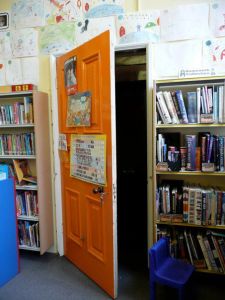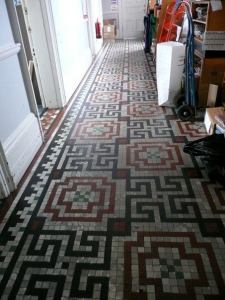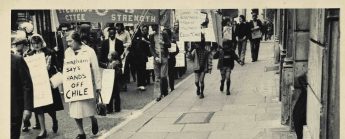
Izzy Mohammed
Saturday 7 February was National Libraries Day. This celebration of libraries contrasted with the protest against the proposed reduction of services at the Library of Birmingham. It is a good time to think about the value of libraries. As our colleague Chris Callow pointed out – the history of Birmingham is for everyone. The MBS blog has already reflected upon the important cultural work done at the Library of Birmingham. Here, Izzy Mohammed offers a biographical account of what libraries meant growing up in Birmingham. Images of Aston Library come courtesy of its former manager Inge Thornton.
In 1973, a Bangladeshi boy was born at 107 Frederick Road, in Aston, Birmingham (the house is no longer there). He would come to be the eldest of seven brothers.
In 1975, his family moved to Newtown.
In 1978, he started at Lozells Primary School. He arrived, not having attended nursery nor having received any other kind of schooling. He started school knowing only two English words; ‘Car’ – and ‘Toilet’.
He remembers how at the age of six, he was laughed at by his classmates. They had been allowed to progress onto the next reading and writing level, but he was held back until he could show he’d genuinely progressed. His memories of that moment are still fresh. He remembers the embarrassment. He remembers feeling upset. He also remembers thinking that he needed to do something. He just wasn’t sure what.

A Family Portrait
At the age of seven, his class was taken on its first visit to their nearest local library, which happened to be Aston Library.

He recalls this as if it were an awakening. He had never seen anything like it. He remembers the towering shelves. He remembers the smell of the books. He remembers having to be orderly even though he wanted to be let loose.
He and his classmates were read a story. He listened intently, mouth open wide. His imagination firing.
The librarian then told the students they could each take out a book. On subsequent visits, they were told they would be allowed to borrow four at a time. And that they could change them all every time their class visited the library.

Not long later, he remembers feeling this wasn’t enough. But giving them a hope, he and a friend were told by a librarian they didn’t have to come with school. If they brought their library cards, they could come in their own time. He remembers feeling that for once he could take charge of his own life. His own destiny. That he could use his own initiative because ‘grownup’ said he could.

Aged eight or nine, he and his friend made a pact. It wasn’t long before they were visiting the library together on Saturdays, in between their school visits, even though this meant walking over half-a-mile, across several busy roads. You couldn’t do that now.
Soon their teacher started asking why they had different books on their library visits with school. He doesn’t remember his answer – only that the teacher didn’t seem pleased. May be they were worried because they knew the journey to the library was dangerous for an eight year old. He never asked.
He remembers that while his friend would pick story books, he found himself interested in books about the First World War, the Second World War, Greek Mythology, Roman Civilisation, ‘Under the Oceans’, Guinness books of World Records, and Astronomy and Cosmology.
By the age of nine, his teacher noted that in ‘reading’, he had somehow progressed ahead of everyone in his class. Every book he was given to read, he would read quickly and return to be tested (he would pass). At times this seemed to please his teacher; at times it seemed to bemuse him; at times it seemed the teacher was just plain worn out by this his prolific reading.
At the age of twelve, whilst attending Holte Comprehensive (his local secondary school), his school class was taken to visit the Central Library of Birmingham. This visit was timely. By this time, the young boy had developed an interest in Astronomy and Cosmology. The planets, space and spaceships fascinated him. At Aston Library, he’d read all the books on these topics; or at least the ones he could understand. He got stuck on the maths in the astrophysics books and decided that he needed to go somewhere else. Though he was continuing to use Aston Library, he could now scour the Central Library for the books that would build on his thirst for knowledge (he knew he was a geek and that he had bad hair – but he always argued, “…so did Albert Einstein and look at where he got”).

Each visit was complicated by the fact that he and his friend never had the money for bus fare. He couldn’t remember how they used to get there. His friend had to remind him. Journeys to Central Library were on foot. If the weather was bad, the books were late.
He remembers leaving school in 1990. He was one of only three or four pupils at the time to leave with all their GCSE’s (he achieved eight A-C’s). But he knows his education – his real education; the one that got him his grades – happened at these two libraries. It was at these public sites of knowledge he educated himself.

Fast forward to 1995: the now-young-man enrolled at the University of Keele to begin a BA Honours degree in Visual Arts and International Politics. He’d always questioned whether he belonged in such a place. But, regardless, he now found himself proudly beginning a new journey. He was grateful. Though he couldn’t afford it, he lived in country at a time when that didn’t matter.
Fast forward again, this time to 2001: The young man enrolled, full-time, on to the University of Leicester’s Masters in Museum Studies programme. He was grateful for the scholarship that made this possible.
In 2013 he enrolled onto a part-time PhD at the University of Birmingham.
He is proud to have gotten this far. He feels he is ‘Representing’. He sees the political dimension of his life and that of others. But struggles with how the world privileges some and complicates the lives of others. He struggles with how the obviousness of these issues aren’t sufficient to bring about social change.
He feels that when he thinks about his own journey he is not simply reflecting on his own education and betterment. He can see how is life is completely unexceptional in its roots and its nature. Just that in his case, the law of probability – and lot of luck – has seen him progress, even if the journey had been painful. He knows it was meant to be – for him. But he feels it is not right that so many others are limited by birth and by place.
He now ponders about what it takes to enable someone from an ‘ordinary’ background to realise their potential. He knows the popular narrative; “…you can make it if you really try”. He understands how this is a problematic oversimplification. He knows he would not be the person he is today if Aston Library had not been there for him. No matter how brazen, a nine year couldn’t make it two miles, across busy roads, to get to the next nearest library. He knows Aston Library was his first critical step to meeting the big wide world and involving himself in it.

The decimation of Library services erodes the principles of meritocracy and democracy upon which the societies of developed nations are purportedly built. But the task of saving libraries should not be compartmentalised. This challenge needs to be seen as a part of a wider struggle to return to a society in which there is genuine equality of opportunity, social justice and plain fairness. People don’t just ‘make it’ through sheer determination. People are born into a world crossed with the tramlines of privilege and disadvantage.
Without local community libraries, how are swathes of people meant to educate themselves? Without community/public libraries, ordinary folk will have reduced opportunities for self-development. This will materially constrain many peoples’ life chances and prospects.
For the ordinary folk, no community library means no social mobility.



















